- Home
- Eoin Colfer
Novel - Airman Page 16
Novel - Airman Read online
Page 16
Impressing the marshall is a good thing, mused Billtoe.
Billtoe’s Balloons, people will call them. By next year they will be launching them in London, Paris, the next World’s Fair.
The guard’s eyes glazed over, lost in dreams of his own fame and fortune. Then he snapped back. It would never be allowed. Prisoners working with gunpowder. Impossible.
I don’t need to work with gunpowder, said Conor soothingly. All I need is paper and ink to design the balloons. Have them made up on Great Saltee if you like, but make sure they are tied to our walls for an impressive shot.
Billtoe nodded slowly. All you need is paper and ink?
And perhaps a day aboveground as a reward. One day a week, that’s all I ask.
Now Billtoe felt as though the upper hand was his. Ah, so that’s it. You would have me defy Marshall Bonvilain himself.
One day. A nighttime stroll, even. I need to breathe the air, Mister Billtoe. These balloons could make you rich. You will be famous.
Billtoe tucked a chew of tobacco under his lip, taking several moments to mull it over.
I will give you the paper and ink, and I will have a single balloon manufactured on Great Saltee, at my expense. If a test is successful, then you shall have your day outside after the coronation. If not, then I will strip your cell of anything resembling a comfort, and the next time sunlight falls on your eyes, you will be too dead to appreciate it.
The test had been successful, spectacularly so, and Bonvilain immediately approved the manufacture of several fireworks balloons in a small workshop on Great Saltee. The marshall was always eager to demonstrate the island’s sophistication to visiting dignitaries, and fireworks balloons would serve both as a delightful show of innovation and a chilling reminder of the Sharpshooters’ prowess.
The marshall jovially assured Guard Billtoe that the balloons would indeed bear his name, if they exploded successfully on the night; not only that, but he would receive a commendation and a generous pension for his efforts. In truth, Billtoe had never seen the marshall so happy. He even hinted that Billtoe could well be sent to various foreign capitals for balloon demonstrations. Billtoe came away from this audience glowing, and well disposed toward Conor Finn.
The exploding balloons were clever contraptions, and Bonvilain did not believe for a second that the idea was Billtoe’s; but the test was such a dazzling success that he did not care who his guard had cut the notion from. It worked, and neither the British nor the French had it. Each pyrotechnical balloon was a simple sealed hydrogen balloon coated with phosphorous paint. Inside the balloon there was a fireworks pack and a short fuse. All the marksman had to do was nail the center of the glowing balloon with a nitroglycerin bullet, and the hydrogen would ignite, setting off the fuse to the fireworks pack.
For Queen Victoria’s entertainment and edification, Bonvilain’s sharpshooters would pop these balloons from a distance of almost a mile. It would be a spectacular finale to the coronation celebrations.
Conor had not shared this idea with Billtoe out of a patriotic desire to excite the coronation audience. If everything proceeded according to his plan, then one of the balloons would bear an extra cargo. A human cargo.
But now, because of Queen Victoria’s superstition, the coronation was being moved forward, and he was not ready. The vital silk sheets were still in a linen closet on Great Saltee. His plans were incomplete. To be thwarted now, having plotted for months, would be a cruel blow.
Conor crawled to the niche behind what he still thought of as Wynter’s bed, popping out the false brick. Crimson sun rays flooded the space, sinking into the coral, which drank the light in and converted it to green energy. He had long ago traded his day job for the night shift, to allow him more daylight for his plans.
In less than a minute, the entire cell glowed with a thousand calculations, schematics, and blueprints. A treasure trove of science brought to life by nature. The walls bore dozens of sketches of balloons, gliders, and heavier-than-air flying machines. These scratched pictures represented two years of obsessive study. All previous diaries had been written over, except the final four bars of Linus Wynter’s opera, and the word Fin.
For the first few months, dreams of the machines themselves had been enough to fuel Conor through the long, lonely hours; but a man cannot stay in the air forever, even in his dreams. And so a purpose for his flying machines was needed. A place to land.
Conor Broekhart would have flown to his parents, to Isabella, but in two years they hadn’t once questioned Bonvilain’s version of events. If they had, surely he would have received a visit or a message. Isabella could have saved him. She could have waved a royal finger and had him pardoned or banished if their young love had meant a thing to her. Obviously it had not. He was deserted and despised. Young Conor felt these things as certainly as he felt the cold rock under his feet. And so his heart hardened and selflessness was suborned by selfishness.
Conor Finn took over, and Conor Broekhart was displaced. And where Broekhart had nobility, Finn had self-interest. He would make himself rich by stealing from the people who had stolen his life. The Saltee Islands would pay for the past two years. A diamond per day. And once he had money enough, he would buy passage to America and begin his life anew. This was his plan, and it kept him alive just as surely as his heartbeat.
And so, how to escape. By land, sea, or air? There was no land; the sea was treacherous; so that left the air. He must fly out of here, or if not fly, then at least fall slowly. An idea was born, but one that was to take more than a year of planning and manipulation. Suddenly the coronation had been shifted and his schemes shattered like broken mirrors, and there were only days to put the pieces together.
Conor lay on the uneven ground, salt water darkening his clothes, studying his plans. He must memorize the designs now, and then destroy them. These plans would be valuable to any army in the world, but especially to Bonvilain. And the greatest torment that Conor could ever endure was the notion that he had somehow aided Marshall Hugo Bonvilain.
He traced each line with his forefinger: every plane, every twist of propeller, each line and rudder, the arrows that denoted airflow, even the fanciful clouds that his artistic side had almost unconsciously etched. As soon as a glider, balloon, or aeroplane was committed to memory, he smeared mud across the design, patting it into every groove.
By sunset, these amazing plans existed only inside the head of Conor Finn.
Billtoe arrived thirty minutes late that evening, swathed from head to toe in silken sheets. “Catch a goo at me,” he warbled. “I’m the emperor of Rome, I am. Arthur Billtoe Caesar.”
Conor was waiting by the door, and was dismayed to see Billtoe’s boot heel catching on the hem of one sheet. He had enough stitching to do without repairing rips, too. “My sheets,” he said, in strangled tones.
Billtoe stopped his tomfoolery. Inmate Finn had that look on his face again. The fearsome one. “Here you are,” he said, suddenly eager to be out of this tiny room. “And while you’re sleeping on ’em, dream about that twelve-shot revolver, partner.”
Partner, thought Conor doubtfully. As if Arthur Billtoe would ever accept a prisoner as partner. Conor caught the thrown sheets, laying them carefully on his bed. “Thank you, Mister Billtoe. These mean the world to me. These and my walks on the outside.”
Billtoe wagged a finger. “After the coronation, soldier boy. After.”
“Of course,” said Conor contritely. “After.” He took a timid step forward. “I was hoping to have the revolver designs ready for the coronation. Perhaps if I didn’t have to work for the next few nights . . .”
Billtoe backed out of the cell. “Don’t even ask, soldier boy. This is starting to sound like a relationship. As though we do things for each other. Favors and such. Well, it ain’t a relationship. Not of the friendly type, at any rate. You do whatever you can to stop me slitting your throat in the night. That’s all there is to it.”
Conor knew better than to w
heedle. Once Billtoe was set in his path, trying to change his course would only send him trundling along it faster. “I am sorry, Mister Billtoe. Of course you are absolutely correct. There’s work that needs doing.”
Conor thrust out his hands for the handcuffs, as he had every day for the past two years. And just as he had been doing for the past two years, Arthur Billtoe ratcheted them on tight enough to pinch. Other guards stopped cuffing their charges after the first while, but not Billtoe. Care only took seconds, but it could keep a person alive for years. Billtoe had no intention of ending his days with his head stove in by some fisheye-sucking inmate who had lost the will to live and replaced it with the desire to commit murder.
“That’s right, Salt. Those diamonds aren’t going to just pop out of the ground and jump into the royal treasury themselves, now are they?”
Conor winced as the steel bit into his flesh. Two more days, he thought, doing his utmost to hide his hatred of Billtoe behind a mask of compliance. Two more days, then I can begin to collect my diamonds.
Billtoe was thinking, too. This one is not broke. He stands broke, but his eyes are burning. I will have to keep an eye on Mr. Conor Finn.
Conor Finn was important to Billtoe, and it was not just for his clever notions and the calm he seemed to have generated in the ranks of the Battering Rams. He was important because every so often, Marshall Bonvilain inquired after the young man’s health. There was a story somewhere in Soldier Boy’s past, but Billtoe had no desire to find out the specifics. It wasn’t healthy to have the marshall wondering how good a man was at keeping his mouth shut. He might decide that the man in question would hold his silence better on the bottom of the ocean, with only the crabs to know the contents of his brain.
Billtoe shuddered. Sometimes his mind conjured the most gruesome images. Perhaps they were memories seeping from Little Saltee’s walls. “Look lively, Salt. There’s more’n you to be seen to, and only Billtoe to see to ’em.”
With a last regretful glance at the precious sheets on his bed, Conor followed Billtoe through the doorway and into the flooded corridor. There was a spring tide that day, and salt water ran along grooves eroded into the mortar. Conor swore he saw an eel wriggling through the tiny torrent. This entire wing was a death trap, and had been for centuries. When he had first arrived there were signs of King Nicholas’s planned renovations: scaffolds, ladders, and such. But these had all disappeared within days of the king’s death.
No. Not simply death, thought Conor. Murder. The king’s life had been stolen, as mine was stolen from me. But soon he would steal it back.
The following days were a blur of feverish toil. By night, Conor mined the Pipe, sucking down the bell’s greasy air almost as fast as the pump team could send it through the vent. By day he worked on his sheets, stitching with lengths of thread he had bartered for, and cutting with a sharp stone whetted on the cell walls. There were twelve panels to be cut, hemmed, and stitched. The silk was not as tightly woven as he would have liked, but there was nothing to be done about that now. It would have to do. The work was flawed, Conor knew that; but how could he be exact with poor light, improvised materials, and no experience? He was most likely stitching a shroud for himself, but even the idea of a quick death held more comfort than a lifetime in this cell.
On the evening before the coronation, Conor almost gave himself away. Run ragged by stitching and mining, he began to behave like the lunatic he was supposed to be. When Billtoe collected him for his shift, Conor’s face hung from his skull like a wet cloth and his lips flapped in a dull mumble.
He is breaking, thought Billtoe, satisfied. It was the sheets that did it. Sometimes reminders of home are too potent to bear. The work will go quickly now; he will be desperate to please me.
The guard clapped on the handcuffs and led the way down the flooded corridor. He inquired on Conor’s progress regarding the revolver, but all he heard in reply was a burble of counting.
Billtoe stopped suddenly, wavelets scurrying from his boot heels.
“What’s that you’re saying? Numbers, is it? A count of some sort?”
Conor barely managed to avoid shunting his keeper. He had been making a count. A vital and secret one. He realized that one slip of the lip could be disastrous to his plan. “A nursery rhyme, Mister Billtoe,” he mumbled, flushed. “Nothing more.”
Billtoe looked him square in the face. “You’re red as a boiled lobster, soldier boy. Are you up to some scheming? Some numbers plan?”
Conor hung his head. “Just embarrassed. Those sheets set me thinking of my mother. Of the rhymes she used to recite to me.”
Billtoe laughed. Perhaps Conor Finn was not as fearsome as supposed. Then again, he had seen bigger men than he with Mummy’s handkerchief clutched in one hand and a bloody dagger in the other. “Come to your senses,” he advised the prisoner. “A diving bell is no place for daydreamers. You’re away with the birds.”
Nearly, thought Conor. Very nearly.
The final day whirled past. For months, time had mocked him, prolonging itself elastically. Each second a yawning chasm. But now there was not time enough to squeeze in the day’s work. To Conor, it seemed to take an age simply to thread a needle. His fine mind was fuzzy with fear. Twice he sewed sections of his contraption upside down, and was forced to pick out the stitches. Sweat dripped constantly from his brow, speckling the silk sheets.
This is ridiculous. I am a scientist. Look upon this as an experiment. It was no use. He could not calm himself. The specter of failure tapped his shoulder in time with the water dripping from the ceiling. There would be other plans certainly; he already had the bones of half a dozen. Some more convoluted, some less so. He had designed a diving helmet, like a miniature bell, which should contain enough air to get him to open water; after that, he could manually inflate a pig’s bladder and swim to shore by night. To amass the materials for that plan would take five years, at the very least.
Five more years. Unbearable. Conor redoubled his efforts, blinking the fog from his eyes, pressing his fingertips together until the shake subsided. The coronation was tonight: he must be ready.
CHAPTER 11: TO THE QUEEN, HER CROWN
The Saltee Islanders were preparing for celebration. The British royal yacht, HMY Victoria and Albert II, a three-hundred-and-sixty-foot paddle steamer, lolled regally in Fulmar Bay with the waves of St. George’s Channel tipping her gently like the fingers of a child on a rubber balloon. The queen herself was happily ensconced in one of the palace’s sumptuous apartments. Her diary records that I find the air of industry in this miniature kingdom wonderfully exhilarating. Looking down from my balcony window at the commerce far below, one almost feels as though one has arrived in Swift’s Lilliput.
Almost every patch of Great Saltee’s two hundred acres had been appropriated for the celebrations. The South Summit was festooned with clusters of pikes decorated with crimson and gold flags. The streets of Promontory Fort were painted in the same colored stripes. Every man with a hammer was banging in nails, and every man without one was hanging bunting from those nails. Even the weather gods were proving benevolent on the day, pouring down sunshine on the little principality, setting the waves dancing with sparkles.
The southern cliffs lost some of their gloom, fringed in beards of white spume.
It seemed to the gentlemen of the world’s press as though the kingdom of the Saltees was an oasis of calm amid the political consternation of Europe. They sat in seaside taverns on Fulmar Bay, boiling up their gullets with traditional spicy gull pancakes and cooling them off again with tankards of Irish stout. No journalists were permitted on Little Saltee, and none had been invited who might press the matter.
On the surface, happiness and contentment abounded, but as in many things, the surface gave a treacherous reading. Many were unhappy in the kingdom. Taxes had been reintroduced, and heavy tithes on imports. Public services were so skimped on that they were almost nonexistent, and residency had been granted to an assorted
bunch of motley characters who were then spiffed up and handed commissions in the Saltee army, the best barracks, too. Common scarred veterans most of them, landing on the port with clanking sacks of weapons. Bonvilain was filling out his ranks with mercenaries and turning away raw recruits. Building his own private army, many said; though the marshall claimed that he was merely protecting the princess from revolutionaries.
Captain Declan Broekhart would, once upon a time, have objected vehemently to Bonvilain’s politics, but now he was too besieged by his own demons. Catherine Broekhart, too, was haunted by sadness, though she concealed it for the sake of their eighteen-month-old baby son, Sean.
Declan was consumed and ravaged by grief. He wore it like a coat. It was more a part of him now than his eyes and ears. It took his hunger and his strength. It ate away his girth and his stature. Declan Broekhart had grown old before his time.
Often Catherine would encourage him to fight his way clear of his dark mood. “We have another son now, Declan. Young Sean needs his father.”
His answer was always a variation on the following: “I am no father. Conor died at my post, doing my duty. My life is gone. Spent. I am a dead man still breathing.”
Declan Broekhart shunned close contact, eager for punishment. He grew tight lipped and short fused. He returned to his duties at the palace, but his manner had changed. Where before he had inspired devotion, now men obeyed him through fear. Declan worked his men hard, chastising honest soldiers who had been at his side for years. No dereliction of duty was left unpunished, however slight. Declan prowled the Great Saltee Wall at night, clothed entirely in black, searching for an inattentive sentry. He demoted soldiers, docked their pay, and on one occasion had a watchman dismissed for nodding off in the guard hut.
This last was three days before the coronation, when Declan was at his most tense. When the news trickled through that the punished watchman was worn out with newborn twins and a wife still in her bed, Catherine believed her husband might come to his senses, but instead Declan Broekhart turned a degree colder.

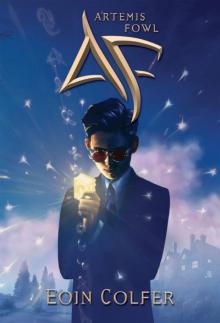 Artemis Fowl
Artemis Fowl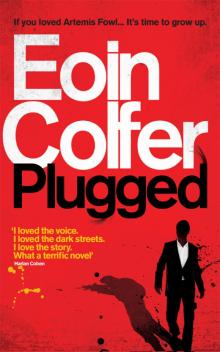 Plugged
Plugged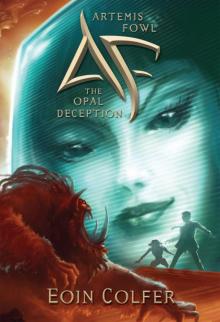 The Opal Deception
The Opal Deception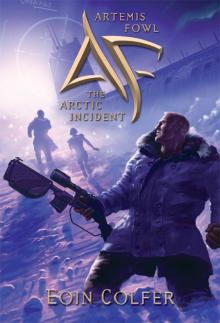 The Arctic Incident
The Arctic Incident The Wish List
The Wish List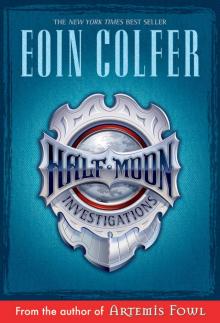 Novel - Half Moon Investigations
Novel - Half Moon Investigations The Supernaturalist
The Supernaturalist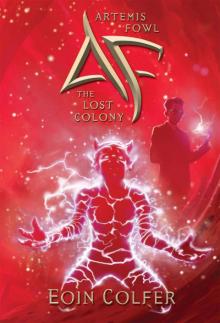 The Lost Colony
The Lost Colony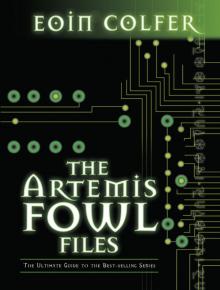 The Artemis Fowl Files
The Artemis Fowl Files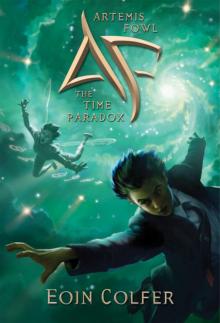 The Time Paradox
The Time Paradox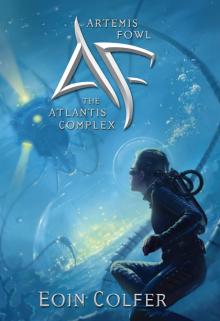 The Atlantis Complex
The Atlantis Complex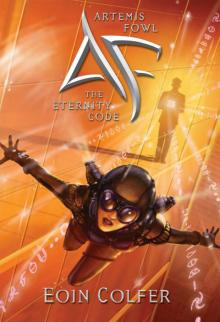 The Eternity Code
The Eternity Code The Time Paradox (Disney)
The Time Paradox (Disney)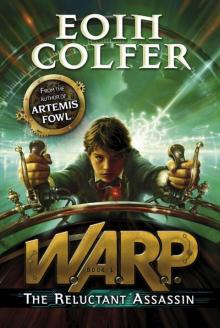 The Reluctant Assassin
The Reluctant Assassin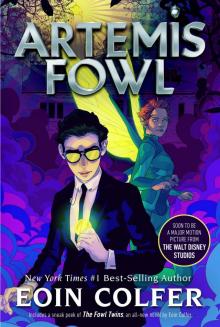 Artemis Fowl (Disney)
Artemis Fowl (Disney) Highfire
Highfire The Last Guardian
The Last Guardian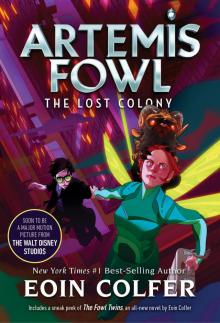 The Lost Colony (Disney)
The Lost Colony (Disney) Screwed: A Novel
Screwed: A Novel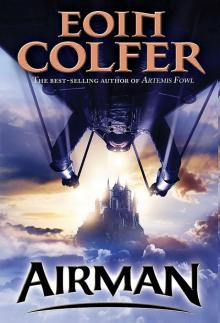 Novel - Airman
Novel - Airman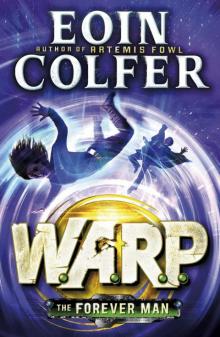 The Forever Man
The Forever Man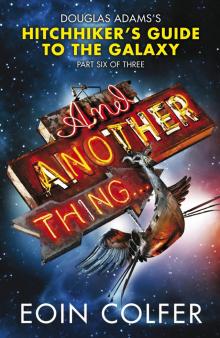 And Another Thing...
And Another Thing...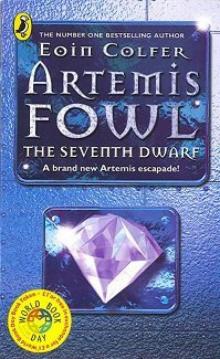 The Seventh Dwarf
The Seventh Dwarf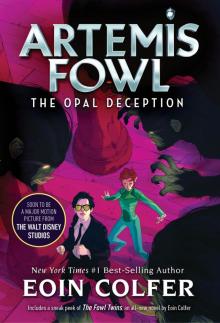 The Opal Deception (Disney)
The Opal Deception (Disney)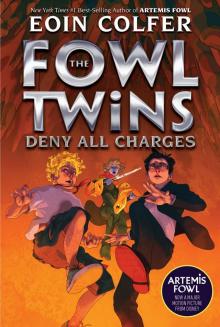 The Fowl Twins Deny All Charges
The Fowl Twins Deny All Charges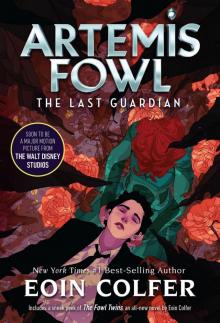 The Last Guardian (Disney)
The Last Guardian (Disney)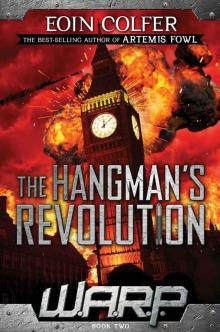 The Hangman's Revolution
The Hangman's Revolution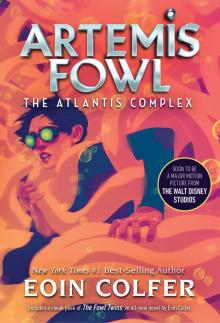 The Atlantis Complex (Disney)
The Atlantis Complex (Disney) The Eternity Code (Disney)
The Eternity Code (Disney)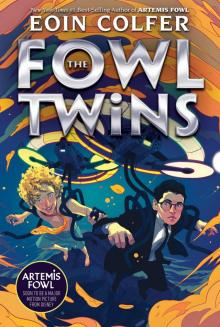 The Fowl Twins
The Fowl Twins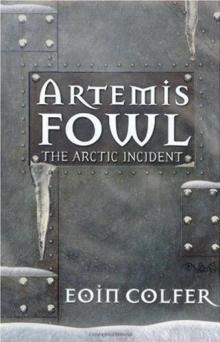 Artemis Fowl. The Arctic Incident af-2
Artemis Fowl. The Arctic Incident af-2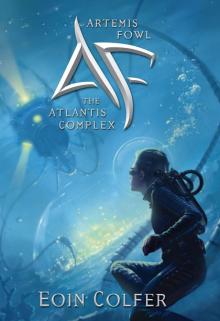 Artemis Fowl and the Atlantis Complex af-7
Artemis Fowl and the Atlantis Complex af-7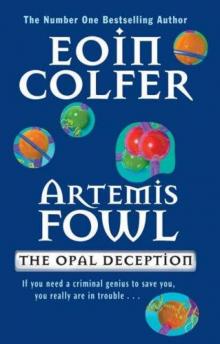 Artemis Fowl. The Opal Deception af-4
Artemis Fowl. The Opal Deception af-4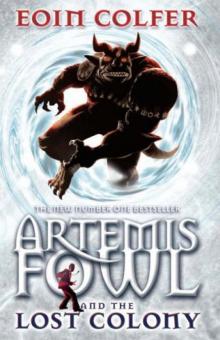 Artemis Fowl. The Lost Colony af-5
Artemis Fowl. The Lost Colony af-5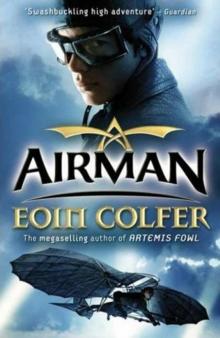 Airman
Airman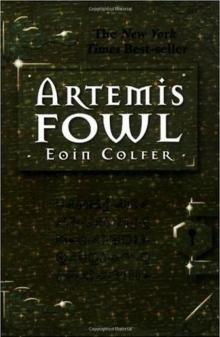 Artemis Fowl af-1
Artemis Fowl af-1 Artemis Fowl: The Eternity Code af-3
Artemis Fowl: The Eternity Code af-3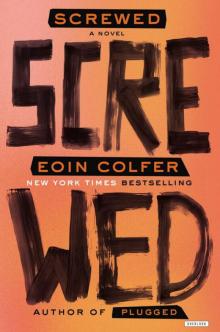 Screwed dm-2
Screwed dm-2